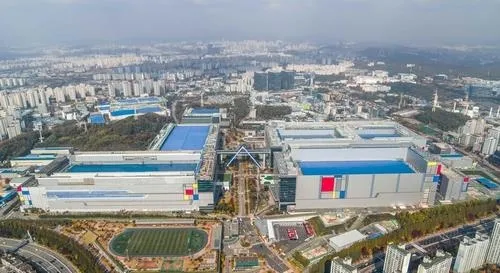Did Samsung Group's market capitalisation exceed $634.4 billion for the first time?

Synopsis
Key Takeaways
- Samsung Group's market capitalisation has exceeded 900 trillion won for the first time.
- The surge is driven primarily by Samsung Electronics' stock performance.
- Samsung Electronics' share price increased by 85.3% in recent months.
- Samsung SDI is collaborating with KESCO to enhance energy storage safety.
- The partnership aims to develop policies related to safety management and emergency response.
Seoul, Oct 22 (NationPress) For the very first time, Samsung Group's total market capitalisation has surpassed 900 trillion won (approximately $634.4 billion) as of Wednesday, propelled by the impressive performance of semiconductor giant Samsung Electronics, as reported by data sources.
The total market capitalisation reached 907.9 trillion won (around $634.4 billion), marking a significant increase of 67 percent from 543.3 trillion won at the end of the previous year, according to data from the Korea Exchange, as reported by Yonhap news agency.
This remarkable growth can be largely credited to a considerable surge in the share price of Samsung Electronics, which soared by 85.3 percent from 53,200 won on December 31 to 98,600 won on Wednesday.
Recently, the share price of Samsung Electronics has risen sharply, fueled by a technology boom on Wall Street and a promising outlook for the chip industry amidst a surge in the artificial intelligence (AI) market.
In a related development, Samsung SDI has teamed up with the Korea Electrical Safety Corp. (KESCO) to enhance the safety of energy storage systems (ESS) as demand for such technology is anticipated to rise significantly soon.
Under a memorandum of understanding (MOU), both companies will work together on developing safety management policies and enhancement measures for ESS and uninterruptible power supply (UPS) systems. They aim to create manuals for accident prevention and coordinated emergency response systems while promoting the voluntary installation of fire suppression and remote monitoring technologies among users.
Samsung SDI and KESCO plan to establish a working-level task force to devise concrete implementation plans and a long-term cooperation framework.
This partnership emerges as South Korea anticipates rapid growth in its ESS sector, aligning with the government's energy transition strategy. "This agreement represents an opportunity to broaden our technological leadership into a deeper social responsibility," stated Choi Joo-sun, the CEO of Samsung SDI.









